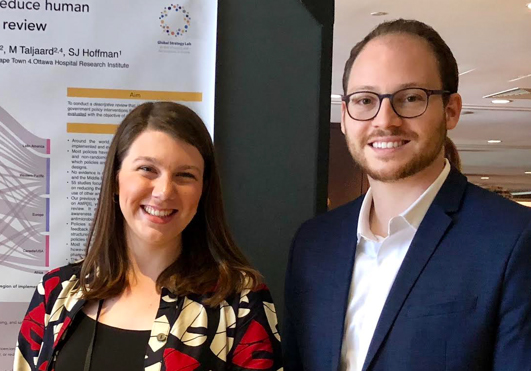
Politics of climate change offer lessons for fight against antimicrobial resistance

The emerging pandemic of antimicrobial resistance (AMR) and challenges to addressing it have parallels with climate change, said experts at a recent online panel on AMR Policy Leadership and Innovation, hosted by York University’s Global Strategy Lab (GSL), as part of World Antimicrobial Resistance Awareness Week.
Similar to climate change, AMR is frequently talked about as a problem where the responsibility is downloaded to individuals, but actual solutions need to be collective ones tackled at the systems level,” says York School of Global Health Professor Susan Rogers Van Katwyk, who is also the managing director of the GSL.
“For many years, I think we really thought of antimicrobial resistance as a problem that was limited to the health-care setting and so it was siloed off to be managed individually between physicians and their patients as a medical problem,” says Rogers Van Katwyk. “What's changed recently is more of a recognition that antimicrobial resistance … has very far-reaching consequences that go beyond human health — that go into animal health, that go into agriculture, food systems, the environment.”
“As Canada’s third-largest university, York is committed to tackling the world’s most pressing issues of our time. Climate change and AMR are among those that highlight the importance of embracing a more sustainable way of living,” says Rhonda Lenton, President and Vice Chancellor. “As a mother and grandmother, I think often about the future that we are creating and the urgency of taking the necessary steps to address these global threats now. We are proud of the GSL’s work aimed at driving positive change in AMR for the benefit of all.”
Timothy Jinks, head of infectious disease interventions at global health charity Wellcome Trust, who was also part of the panel, points out that the global ramifications of AMR are felt unevenly.
“The impact and consequences of Antimicrobial Resistance is felt greatest by people in sub-Saharan Africa, South Asia and Asia.”
Wellcome has granted the GSL $8.7 million for the AMR Policy Accelerator, a unique initiative that will provide vital research and services to support evidence-based policymaking and the development of effective AMR national action plans.
Rogers Van Katwyk says one thing the climate change space has done very well is using targets as a communications tool, something the AMR space could learn from.
“You see these news articles that come out on a regular basis that assess whether the world is on track to meet those goals and if they're not, then we have an entire conversation on a regular basis about what needs to change.”

GSL director Steven Hoffman, who is also a professor at York University’s Faculty of Health and Osgoode Hall Law School, moderated the panel.
“A lot of the conversation around climate change, just like a lot of the conversation and antimicrobial resistance, is often around benefits and of action and burden sharing, and mitigating causes, but also recognizing that the historical contribution to the development of a problem is not equally shared across countries,” Hoffman notes.
For decades, the overuse and misuse of antimicrobial drugs for human health, agriculture, and the environment have resulted in bacteria, fungi, and other microbes that are increasingly resistant to essential life-saving medicines. As a result, even simple infections are now more complicated — and sometimes impossible — to treat.
“The AMR policy accelerator is really designed to help governments address the policy challenges that we've been working through in this space,” says Rogers Van Katwyk. “Our platform has really been designed to help bridge the scientific evidence to that policy space.”
Other participants included Raheelah Ahmad, knowledge mobilization & policy lead with the System for Enteric Disease Response, Investigation, and Coordination, and Arshnee Moodley, AMR team leader with the International Livestock Research Institute in Kenya.
Ahmad says it is important not to flatten the issue.
“I can think of excellent examples in Kerala, India, at the Amrita Institute, who have excellent IT systems within their hospital, which I have not found in some parts of high-income countries,” she said during the panel.
Similarly, even high-income countries have settings that are lower resourced.






